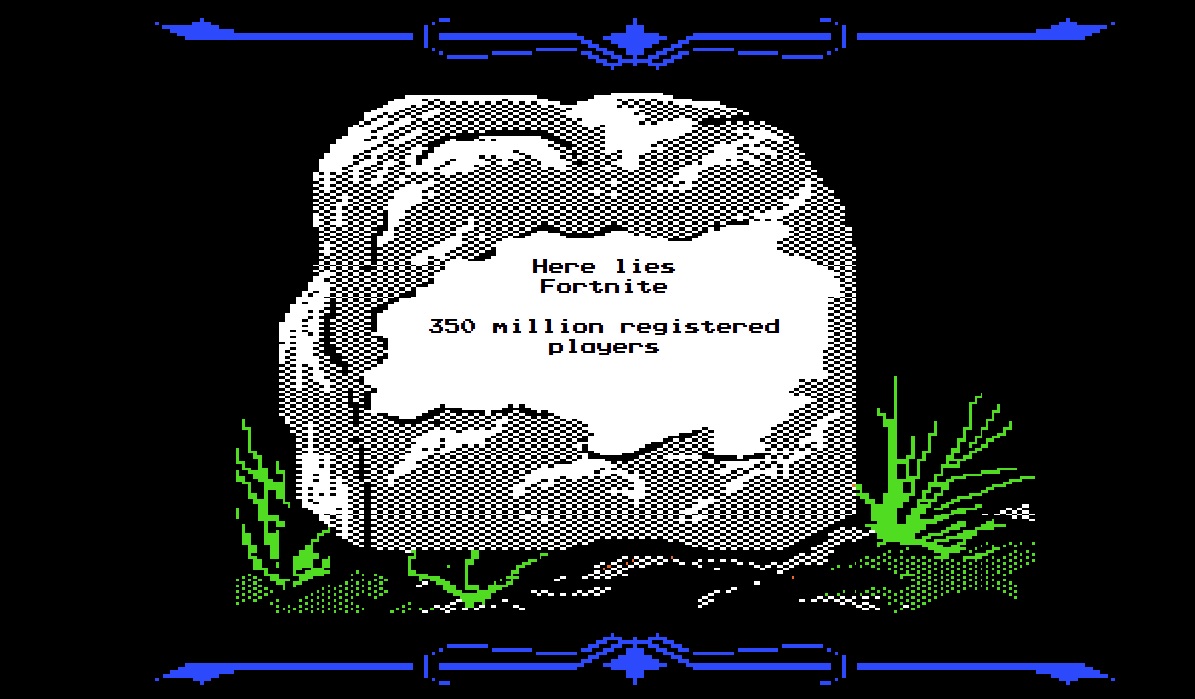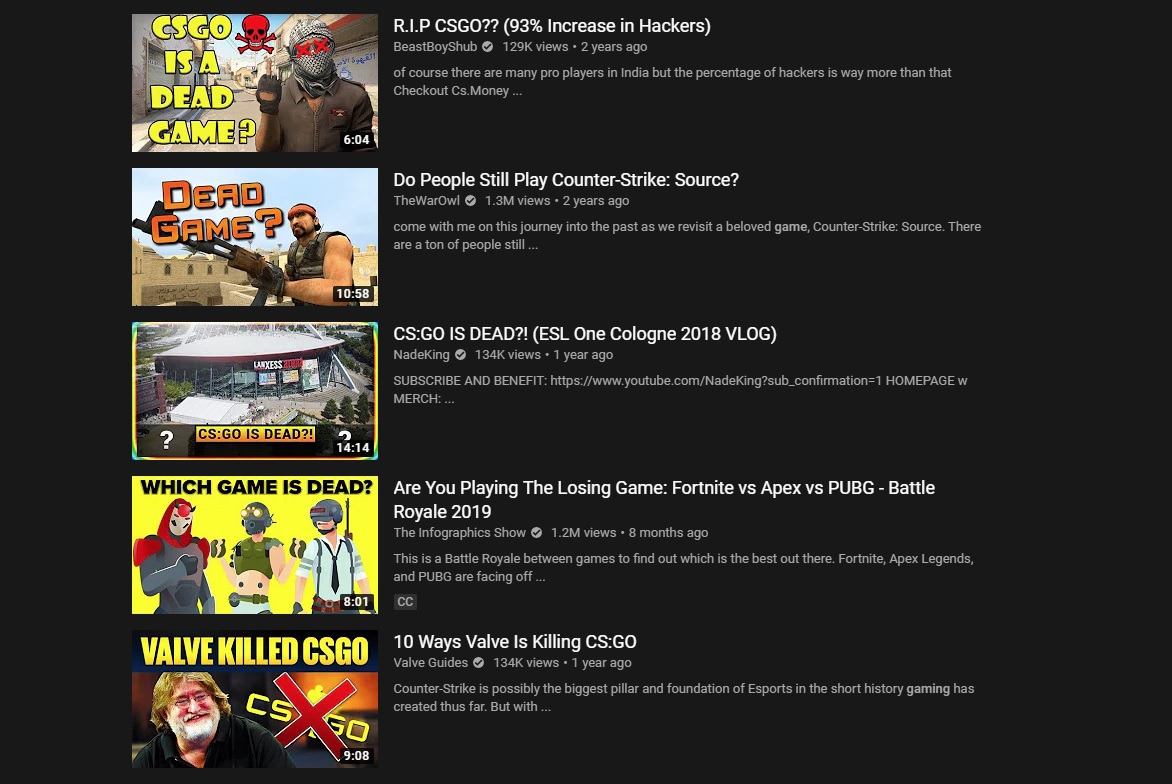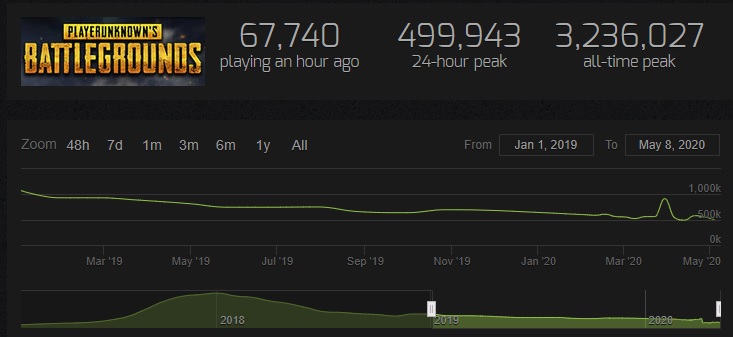Why 'dead game' needs to die
The eagerness to declare games dead is a corrosive and persistent meme.

Three months after the launch of Apex Legends, as Respawn's surprise Battle Royale was settling into its early life as a competitive FPS, the Kentucky Fried Chicken Gaming Twitter account posted a meme. In it, a rudimentary drawn stick figure pokes the bloated corpse of the Apex logo: "Come on, do something," it pleads.
Respawn was in the middle of Apex's inaugural season, and barely scratching the surface of some of the plans tucked away for the following summer and winter. The months ahead would bless the game with new heroes, weapons, maps, and esports initiatives. But as far as the edgy, Gen Z-baiting KFC brand account was concerned, Apex Legends was already a "dead game." The zeitgeist had moved on, the Fortnite-killer was killed, and any quantifiable ongoing success was a moot point. Born February 11, 2019, before passing on into the digital afterlife on May 11. RIP.
pic.twitter.com/kHKnVgmKGlMay 13, 2019
"Dead game" has become one of the most intrusive and counterfactual memes on the internet; it brings to mind the recess console wars of '04, where nine-year olds would toss barbs at each other for their allegiances to Microsoft, Nintendo, or Sony. The crux of it is that once a game notices the slightest ebb in popularity, a wave of insurgents gather to declare it "dead" and dance on its grave—much to the chagrin of the community.
The trend of pronouncing a game as 'dead' seems inextricably linked to the way games have merged with the internet.
—Don Caldwell, KnowYourMeme
Here's a short tabulation of games that I've seen declared deceased by the judges of Twitch chat: World of Warcraft, Hearthstone, League of Legends, PUBG, Dota 2, and even Fortnite. Those same games, of course, are some of the true power brokers of the industry—Apex Legends was just one victim of a culture that's become increasingly impatient within the games-as-a-service ecosystem. If you boot up the servers today, you will still find a panoply of players giddily enjoying their shooter of choice, no matter what a fast-food restaurant has to say about its future. In 2020, now that games themselves are platforms, that same tribal toxicity has transmuted into individual games, competing for the top slot at the lunch table.

Pronouncing death
So why are gamers so obsessed with player count? Why does a two-month content hiatus lead to people dancing on a grave that isn't even full yet? How many more times must we watch some YouTuber point to a Google Trends page to eulogize a game that hasn't, and probably will never, die? Don Caldwell, editor-in-chief of the internet hivemind database KnowYourMeme, tells me the site first noticed "dead game" gaining traction in the mid-2010s, specifically in relation to StarCraft 2. "[There were] over 1,000 posts submitted to r/StarCraft [containing the phrase 'dead game,'] prior to 2015," he tells me.
StarCraft 2 makes sense as the ground zero. One of Blizzard's most hallowed franchises has been sidelined after the sequel trilogy wrapped up, and it's been genuinely heartbreaking to see the game get sidelined at BlizzCon year after year. Clearly, the StarCraft faithful have a reason to bemoan the relative deadness of their dead game; but unfortunately that allowed the meme to infect the rest of the gaming industry, to the point where it could allegedly "kill" Apex Legends after a mere three months.
Caldwell believes that this is a symptom of the changing relationship between a game studio and its corresponding player-base. It wasn't long ago that a product would release to the public fully-formed, with the faint promise of a couple map packs down the line. (I can't be the only one who purchased the Halo 2 expansion on a physical CD.) But the game-making has only gotten more amorphous and decentralized in recent years; there are so many successful late-bloomers (Rainbow Six Siege, Destiny), ongoing resuscitations (Fallout 76, No Man's Sky), and optimistic launches that turned sour (World of Warcraft: Battle For Azeroth, and, well, Apex Legends), that public perception of success can change on a dime. It's a devil's bargain the games industry struck when it pivoted to a service model in the first place.
Keep up to date with the most important stories and the best deals, as picked by the PC Gamer team.
"These games often have interesting relationships between players and developers, and many of the games are being consistently updated and tweaked throughout their life," says Caldwell. "The trend of pronouncing a game as 'dead' seems inextricably linked to the way games have merged with the internet in this way."

The difficulty of data
And unlike the early 2000s, forumites have data they can use as ammunition. Dead game claims are empowered by the wealth of analytical information relayed to the players with tools like the Twitch charts and SteamSpy. A slight dip of player density during a slow month can be taken out of context and rubbed in the face of a game's most ardent fans as fundamental proof of inevitable, irreversible decay. We all know that's silly; for most of 2019, League of Legends has occupied the top spot on Twitch with nearly double the players of Fortnite in second. But two years ago, most Twitch scholars believed that Riot would never recapture its prime territory ever again. Those normal, moment-to-moment statistical fluctuations are red meat for any troll, and that can completely alter the conversation on Discord servers and subreddits.
Hopefully "dead game" appears increasingly lame and out-of-touch as these games keep refusing to die.
Anjana Sursala is a professor at Michigan State University and has researched the ways social media algorithms can fuel the internet population's perception of truth. (In particular, she's done a lot of work on how the algorithm intersects with celebrity cancelling campaigns.) According to Sursala, when a meme catches fire, no matter the content, it ends up being read with a certain legitimacy. The upshot? No matter how alive a game like Apex Legends might be, if it's called "dead" by enough people, that overshadows the facts.
"Once a meme reaches a threshold of visibility, subsequent online conversations between individuals only magnifies the influence and spread of these memes," she says. "The evidence seems to suggest that when a meme is shared enough times on social media, it does acquire credibility from potential audiences."
This is especially endemic on Twitter, adds Sursala. Social media algorithms are built to fuel user engagement, which means that posts that are particularly divisive end up filtering to the top of your Twitter or YouTube feed. "Social media gives us the ability to retweet, like and share our opinions with others, so more conducive to viral activism," she says. "Dead game," with its blend of derisiveness and reactionary pomp is the perfect meme for the gamer culture we've inherited.
I'm not sure what will happen from here. I think we've all given up the ghost that our online discourse will somehow get more peaceful or truthful. Games culture itself has been marked by dozens of different skirmishes over the years; PC vs. console, Mario vs. Sonic, inverted controls vs. normal people who aren't from hell. "Dead game" feels like another regrettable chapter of a long, annoying book.
But hopefully "dead game" appears increasingly lame and out-of-touch as these games keep refusing to die. With Season 5 arriving next week, Apex Legends has a long future in front of it. So does League of Legends, Dota 2, and hell, even StarCraft. We can all do our part by not treating concurrency data and streaming metrics as an absolute measurement of a game's popularity. We should be so lucky to live in a world where Kentucky Fried Chicken doesn't declare a game dead just because it's been two months since the last patch.

Luke Winkie is a freelance journalist and contributor to many publications, including PC Gamer, The New York Times, Gawker, Slate, and Mel Magazine. In between bouts of writing about Hearthstone, World of Warcraft and Twitch culture here on PC Gamer, Luke also publishes the newsletter On Posting. As a self-described "chronic poster," Luke has "spent hours deep-scrolling through surreptitious Likes tabs to uncover the root of intra-publication beef and broken down quote-tweet animosity like it’s Super Bowl tape." When he graduated from journalism school, he had no idea how bad it was going to get.

